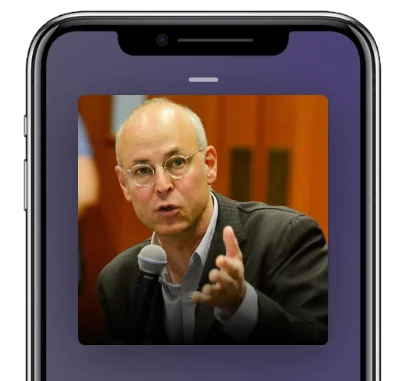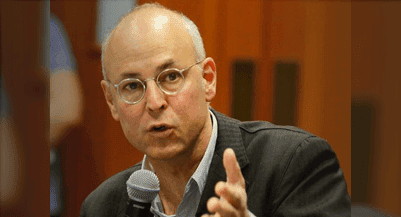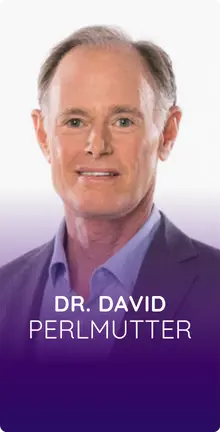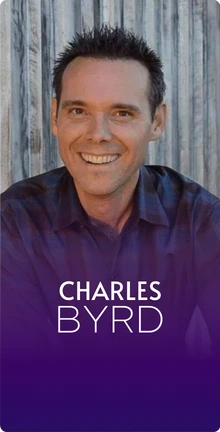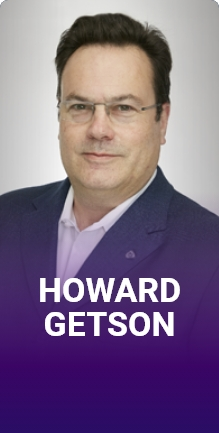Thank you so much for having me. It’s a privilege.
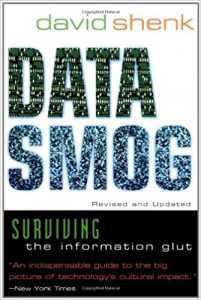
Thank you. Well, the privilege is all mine. I’ve known about you since the 90s when I first picked up your book, Data Smog. Now you’ve got six books and I want to talk about several of them. Let’s start with what was the premise behind Data Smog? Why was it so important that folks understood the information glut? Now, it’s beyond crazy. What we’re experiencing on a daily basis is 100X what I was imagining when I was reading the book.
It’s interesting to answer that now because obviously, it’s been such a long time just for context for the listeners. Data Smog first came out in 1997, so it’s been 22 years and I do regularly get people saying, “How did you know all this 22 years ago?”
You’re a time traveler.
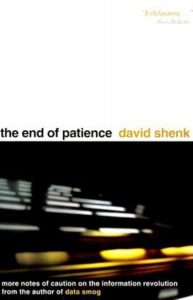
Truth is at the time I was already building in what other people had been saying for at least a decade. The way I came into Data Smog was that I had been studying for a couple of years, first as an academic way, then as a journalist or a reporter, and hopefully a thinker. What was going on with our democracy at the time, which by today’s standards seems very healthy and normal, but there was something going wrong even then, or at least the inklings of something wrong, which is that there was just less and less participation in the democracy.
When you did knowledge polls of what people actually understood about just the really basic things in our government, how our country worked, people were really out of touch. They knew nothing. I started asking people, when I lived in Washington DC, why that was. The question always came back to how little people knew and a lot of smart people are saying it’s because people are too busy and they’re overloaded with information.
I went down that rabbit hole. The funny thing about that is that humans have existed for 100,000 years – many thousands of years. It’s only recently, in the broad swath of time, that we’ve had this problem of too much information.
Just before I was born, for 100,000 years, the main problem with the information that people had was that they couldn’t get enough of it and they couldn’t get it fast enough. Their lives were literally in peril because they couldn’t get data. It’s hard to study. It’s hard to understand complex subjects. It was hard to communicate with people and get important information that would literally keep you alive.
Sometime in the mid-20th century, that started to flip and it flipped very quickly. In terms of evolutionarily, it flipped with just a blink of the eye. Suddenly, here we were in the 90s where everyone was feeling this feeling of just being overloaded.
Shortly after that, media exploded and all of us now have a big problem with the information that we also have with calories which also used to be the reverse. For most of the human time span, it’s been, “How can we get enough calories to survive?” Now, most of us face the opposite problem. How can we keep calories out of our bodies so that we don’t die from having too many of them? It’s the same with information. How can we sift through the information? It’s not to get the information to stay alive, it’s how to sift through the information to make responsible, intelligent, sometimes life-saving decisions.
That was the big context. Sorry for the very long answer. I’ll try to wrap this up. The quick summary of Data Smog is I try to catalog all the different problems in our democracy and our culture that we are already starting to face and that I fear we would be facing more and more from suddenly being in this glut situation. I did so not from a Luddite perspective. Not like, “Turn all your machines off and let’s go back to when the information was scarce.” I, like any other thinking, breathing being could see all of the advantages. It’s just that I thought we had to focus for at least a little bit of our day each day on the drawbacks and the challenges.
It's our duty as human beings to sift through the information we consume to make responsible, intelligent, and sometimes life-saving decisions. Share on XThe book was about surviving that information glut. How did we fare? Did we survive it?
I got to say while the advantages then were obvious and have continued to proliferate and in some ways had been tickled by how enormously amazing some things are with the speed of the information and just the effortlessness of communication. There are some obvious things that even in the 90s we couldn’t even really conceive. Now, in the age of the iPhone, everything’s different. While there are many marvelous things, many of which we could have predicted, and the rest of which are just now obvious, I have to say, even in that context, I never imagined in my darkest recesses that the negative would get as bad as this. I do believe, not to get political but trying to avoid…
It’s hard not to.
Yes, I do believe that literally our democracy is on the precipice right now. I think that it’s not unrelated at all to the challenges that I mentioned in Data Smog. We are drowning in the problems from information glut and from the inability to keep our head above water and face those challenges intelligently, to the extent that we are being exploited by preposterously malicious actors in the economy and in politics. Those people are taking advantage of our vulnerabilities that have to do with being overwhelmed by information. I don’t think we’re doing very well, to sum it up.
It’s crazy. If 20 years ago, imagine where we’d be at. It’s like a bad spy novel or something. The stuff you see on Twitter and things, it’s like a smokescreen to distract us from the real problems. Our environment is getting exploited, these bills are getting passed that have no business ever making it through. It’s just crazy, what’s happening.
It is. Demagogues have existed before in pre-Internet age, they go way back. You don’t have to go very far back. You had the Nazis but you can go back much further than that. Certainly, the idea of demagoguery is not new but there is something special about the nature of demagoguery right now and how it finds our weaknesses.
The weaknesses often have to do with the lack of central, reliable, serious streams of information. No one really knows what they can trust anymore. We’re so scattered and so atomized informationally that as Mark Twain said, “The lies run much faster than the truth.” Everyday now, it seems impossible to catch up with them.
I think the solution that people are going to opt for is to rely more and more on intelligent agents, personal assistants that are AI-based. Talk about the filter bubble on steroids. If it’s just feeding you the things you want, then you’re blindsided to all the stuff that you should know about. But it doesn’t get the interest levels, the clicks, the engagements, so it doesn’t get served up to you. I think that’s a real threat to our democracy and to our free will. That’s pretty scary.
I agree with you. The essential problem right now is just how divided we are. We are divided in two ways if you look at it really bluntly, but we’re also divided into many different, little, tiny segments. As you were suggesting, each segment has its own little stream of information that we plug into that gives us what we want to hear, what we’re most interested in, and according to some value system that we can identify with.
We’re really watching quickly the end of any kind of meaningful, generalized culture where people from different segments, from different demographics, from different backgrounds share the same facts and actually talk to each other or at least share the same sources, the same trusted sources. God help us. I don’t know what the answer is, except for at the most basic level. I think about young people all the time now and just try to drill the importance of fact gathering and skepticism into young people so they don’t get tricked into thinking certain things that just aren’t true and that people would be happy to sell them as false truths throughout their lives.
Our children need to understand the power of confirmation bias and how they manifest this so slyly into our lives, into our digital lives in particular. We’re just getting confirmation that things are the way we think they are but they’re not true. It’s just some opinion piece, a wolf in sheep’s clothing. It’s not really news, it’s just an opinion.
If I can just give one, the very darkest cap to that point. On Monday, I just flew back from spending four days in Minneapolis where Al Gore’s foundation, the Climate Reality Project, was hosting one of its leadership training projects. I was lucky enough to be included, largely because my brother, John Shank who’s a noted documentary film-maker, actually made the sequel to An Inconvenient Truth with Al Gore, so they know each other quite well.
We were there with another 1000 people who were training to learn about climate change in some depth and be able to communicate it. Before this weekend, I knew as much as your average New York Times reader, but to spend four days immersed in this and really see right in your face for that long time the facts, where we are, and where we’re going if we don’t make a pretty sudden turn.

The word is apocalypse. We are literally headed to the end of human civilization. I wish that were an exaggeration but it’s not. It’s a simple fact and the reality that most people don’t understand that and the ones who do manage to not think about it at all. There are other challenges that we face right now but it’s the big kahuna.
It’s also just emblematic of this incredible, extraordinary situation we find ourselves in which is that fact upon fact upon fact upon fact. Literally, every day there are new facts that confirm these facts that we already know and if anything, make them scarier. They’re right in front of us. They’re verifiable. You can just look at very simple charts that have been verified by people who are very serious and study this stuff from every possible angle. They all end up with the same word which is apocalypse. The fact that we haven’t really taken that in and seriously tried to do something about it as a nation is dumbfounding.
It’s dumbfounding that there are actual Holocaust deniers out there. It’s dumbfounding to me that there are climate deniers out there, too. Do we just lose all hope and build our apocalypse shelter? What do we do?
Well, we could talk about climate change for a while. I’m going to give you an honest answer because I’m still working this through. Climate change is something I personally have never tried to seriously communicate about. As you know, I’ve bitten off a number of other complex subjects and I’ve haven’t done climate change. I maybe haven’t done is specifically because my brother, John, did do it. I figured, well, one of us is doing this and let him take that one.
But now, it’s really the only one. It really is. I’m just trying to process what I learned the last couple of days which is that there are actually a lot of really wonderful things happening in our rapid conversion to a sustainable energy world, lowering emissions, doing a lot of really fantastic things to mitigate the damage to the earth. There are a lot of positive signs in terms of human action. Many of them are just market based which is nice. The market sometimes often works much more efficiently than any government could. That’s all good.
The really horrifying truth is it’s not happening fast enough and it may really be too late. That’s not something that they said at the conference but if you look at the facts just as coldly and hardly as you can, that is a message that is hard to avoid. I guess we won’t really know the answer to that.
I guess to answer your question, we have to do two things. One is that we have to move at nearly impossible speed to rejigger everything we do about energy and emissions. Every single person should be thinking about this, making it a priority, and making it a community priority, city priority, state priority, national priority, and international priority. We have to. We absolutely have to.
If we lose this election, by the way. That is if we elect the person who is still a climate change denier in 2020, we are probably looking at the end of the planet. It’s literally that true. Just four more years of complete inaction in the United States, if we haven’t hit the tipping point, that is probably it.
But we also have to do a second thing, and this is what I’m trying to wrestle within my own mind, figuring out how to talk about this. So, this is pretty raw right now, I’ll admit to you. We have to do all those things, but we also have to take it on faith that if we put the pedal down now and do everything we possibly can that it would actually do enough good in the long run. Say the next 30, 40, 50, or 100 years to actually stop the apocalypse.
That’s something that we actually do not know and we won’t know. We have to do all the right things and we have to have faith that doing all the right things at the quickest possible speed will bring us some mitigation and life-saving. Maybe the thread of hope is that having faith and marrying that with action is one of the things human beings do best when we are pressed. Maybe those two things do go together very nicely.
Our generation is drowning in the problems of information glut, that it's crucial to assess information intelligently to protect ourselves and the future generation from economic and political exploitation. Share on XIt’s like we are being pushed up to the wall and this is where people shine. Some horrible tragedy happens like 9/11 and the entire community gathers together and works as one cohesive unit. Maybe that will happen. I don’t remember the stats but it was pretty jawdropping to see it was roughly 100 trees per person on the planet have to be planted in order for us to bring things back to normality. All seven billion people will have to plant something like 100 trees each. That’s not going to happen. I hope it happens, but I’m not holding my breath for that one.
There’s a lot to do and we are starting to do it. Some of the most optimistic things are how fast communities, cities, and even some states are moving into a commitment of 100% renewable energy and zero emissions by the year 2040 or 2050, which is probably too late, but even that is a remarkable thing and if you look at the predictions from 10 or 20 years ago about how fast just technically we could adopt renewable energy—wind, solar, things like that—the most optimistic predictions were tiny compared to what we have already done. It has scaled. It has built up an incredible moment and we actually have the technology to leave fossil fuels and combustible engines behind.
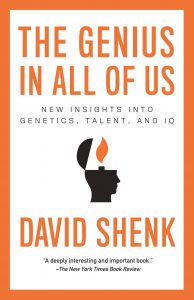
We have that technology. Anyone who just bought an electric lawnmower or an electric car knows that. We’re hurtling towards that future. That’s going to be amazing. That part is happening. Then there are other big pieces of the pie that needs to be wrestled with, but you are right. When pressed against the world, we have the amazing ability to adapt. We are adaptable and this might be a pretty interesting segway to the Genius in All of Us—I’ll let you decide—but the very final, ultimate, and bottom-line point that I make in the Genius in All of Us has to do with our adaptability which is extraordinary.
We are certainly going to need it. It will be interesting times as well where the technologies advancing such a faster and faster clip, that’s the Law of Accelerating Returns. So, it won’t be long before we have artificial intelligence that isn’t artificial anymore. It’s sentient, it’s autonomous. Autonomous intelligence is going to be the new AI, A standing for autonomous.
Where does that leave us and the planet could just be this barren rock and we’re all dead, but then the AIs live on because they don’t need the natural resources as we do. The food, water, and all of that. I don’t know. Let’s talk about the Genius in All of Us. I’m getting a little too depressed here.
That stuff could really happen. I’m not a futurist. My imagination is not that big, but it’s not hard to imagine that what you just said is the future of the planet.
In fact, the movie AI has the premise that humans are long extinct. I hope I’m not spoiling the movie for your listeners, but it was a great movie. Stephen Spielberg. This post-apocalyptic world is occupied by AI machines, very advanced. They get access to this “boy” who is an AI from the distant past and that’s their closest link to understanding what humanity was like for millennia ago. That was the premise of the movie. It could be a real thing that happens.
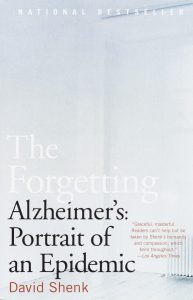
Let’s talk about The Genius in All of Us. I would love to understand what your impetus was for writing that book because it’s a pretty significant departure from your other books, but I guess there is a threat that ties them together like Data Smog, having this information glut means we are not able to process things with clarity and so forth, which is what happens I guess to the degree with Alzheimer‘s. You have The Forgetting book which is all about Alzheimer’s and maybe you then started to explore what makes us uniquely human in terms of how our brains work and so forth. That led to The Genius in All of Us. I don’t’ know. I’m just speculating. You tell me what had happened.
You are actually missing a book between there, which is The Immortal Game. I’m doing that not just plug it, but just to laugh about it because what you are saying is even more true. You actually tried to find the one logical thread that pulls all these things together as though a planned epic career-long plan to write exactly these books and tell this one story.
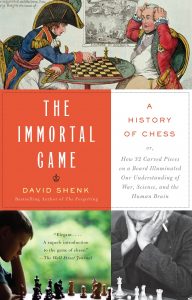
I’m sorry that I don’t have that story to tell, but yes, there are links between all of them. I could draw those. It might be more interesting just to tell you the actual way that I got into this topic which is that in the middle of researching and writing my book, The Immortal Game, which is a book about the history of chess. One of the themes of that book was just my continual astonishment that the book, The Immortal Game is not really about chess. It’s really about trying to answer the question, “What is it about chess that it lived continuously for 1500 years through all modern civilization, all medieval civilization and going back even further than that, continually never died?” Has been played by five-year-olds and 95-year-olds and everyone in between. Has gone through every single language, every single culture, and with relatively few modifications—a couple of meaningful ones—but the game really is fundamentally still the game that it was as we understand it 1500 years ago.
You can’t say that not only about any other game. You can’t say that about anything left right now on earth except for maybe beer. There is almost no food, no word, no even idea that has lasted that long. We have this board game that you probably have in your living room and listeners do. We all have in our Iphones and we are still playing this game.
I wanted to know what is the power of this game and the answer that quickly emerges—if you keep trying to see the forest through the trees, which is really fundamentally my job when I enter any subject like this, I start getting overwhelmed with the facts—is that yeah, it’s fun to play, it’s interesting, it’s captivating, and all that, but the thing that seems to have kept it going that made it so appealing to so many different cultures is that it teaches us things about ourselves.
It gets used in all sorts of ways. It just does not intersect with our real world. It’s our own world and yes, we have their metaphorical pieces named after certain armies and positions in the army and things like that. It’s actually its own bubble and it’s own self-contained world.
It’s both very simple to play. You can learn to play in 10 minutes. A five- or eight-year-old can learn to play but it’s also virtually infinitely complex. And that you really, as a human being, never run out of possible things you could do in a game. If you look at the number of zeros involved, the number of possible games, they can actually never be played ever. It’s that many. It’s more than the molecules in the universe. It’s crazy.

It’s that dynamic and that dynamic has turned out to make just a PowerPoint of various generations. It’s been a teaching tool. It’s been a tool to study many different things and also teach many simple and complex ideas.
One of the things that scientists have studied is ability, talent, and memory. I’m linking those things together but human ability. The human ability to become really good at chess and other things. Many different tangents in the research of this game. One of them is to study the science of talent research and what emerges from that in the 50s, 60s, 70s, 80s, and 90s.
One of the things that kept coming up and the more years that go on as we approach now, is this idea of talent researchers discovering that talent, as we think and describe it, even the world talent seems to becomingly understood as this connection to gifts that we are born with which we vaguely described as being genetic.
The concept of innate talent is really a false one and one of the ways we know it’s false is a thought experiment. Before we had genes to use as a reference point—this is the beginning of the 20th century—for all human history before that, we refer to it as gifts from God.
It was the idea of innate talent that was powerful, but the actual fact of it turns out not to be true. It turns out as you study what we still call gifts, talents, and natural abilities, they actually all turn out to be skills that we develop. Many millions of micro-skills that end up being herded together as they get to develop.
I’m not saying that’s not connected to our genes. Everything is connected to our genes and everything is connected to our genetic differences, too. One of the things that vastly influences how you became a different person for me is the fact that you have genes from me, but that doesn’t mean that your genes had these book of man written instructions about certain abilities that you were going to have that I wasn’t going to have. It means that you simply have these genes that when they turned on and off, do slightly different things from some of the genes that get turned on and off.
Both of us have personalities, abilities, skills, thoughts, ideas, you might call talent, which is just a collection of skills, which are the result of our respective genes getting turned on and off constantly from the moment we are conceived to the moment we die by the lives that we lead.
The air we breathe, the food we eat, the thoughts that come into our head, the words we speak and hear, the music, everything. Every single scrap of experience interacts literally with genes that get turned on and off like light switches, up and down like knobs on a soundboard, to produce the proteins in our body which end up building the connections in our brain, which end up becoming the skills we do or we do not have. The fundamentals of that, which I refer to as the developmental understanding of talent. The fundamentals of that idea, part of them were actually discovered through the study of what makes people great at chess.
I can’t even go to all the details of these studies no, but suffice it to say that as I was reading that I was like, “Oh, look at this body of research where people are saying radical things about talent,” particularly in the 70s and 80s were it was just accepted that giftedness was a genetic giftedness. We had all these great examples of Einstein, Mozart, Michael Jordan. All of these people couldn’t possibly develop these skills. They seem magical, so they must have been born with this thing that the rest of us weren’t born with. That must be a genetic thing since that is the kind of paradigm that we use as well.
The world is headed to an apocalypse, yet the people don't understand what it truly is. And the ones who do manage not to do anything at all. Share on XThat turns out to be wrong as stated. I was reading a bunch of studies that suggest that as I was reading/writing/researching my book Immortal Game, I say it that way because my process in writing books is a constant cycle of everyday, every hour reading, researching, reading, researching, reading. It’s not that there’s a research phase then the writing phase. They really mesh constantly.
I started building the stack of articles. I was gathering on that subject as I was working on the chess book. By the end of that book, it was just obvious how I had this other topic to tackle and that’s what I did. I spent another three or four years writing what turned out to be The Genius in All of Us.
While you are describing this research and the fact that it’s not just passed simply through our genes, these abilities, I’m reminded of a story I heard relating to chess where a man married a woman with the intention that he was going to raise children who are going to be chess champions. Do you know who I’m talking about?
Yes, I do. Not only do I know about the Polgár family, I know the Polgár family.
Why don’t you share who these folks are and how this all works because it’s pretty fascinating, the story that I heard about it. I’m sure listeners are not that clued into it.
Forgive me for forgetting some of the names and things like that. This is a great story and no anecdote proves a point. I’m not saying that when you hear the end of the story, I’m saying it obviously proves that my thesis about developmental skills is correct and innate skills is incorrect because you’ll hear the story and you’ll think that I’m trying to argue as proof, then you’ll come up with certain rejoinders, which seems to prove that the opposite could be true and it could be. Just take all that as a caveat.
It is a fantastic story that is a living, breathing story that is a part of the now humongous universe of research which backs up my conception. It’s not mine, but the conception I’m talking about the myth of innate gifts and the true alternative universe of developmental skills.
Having said that, the story of the Polgár family is that there was a gentleman, I believe his name is László Polgár, I’m sure I’m mispronouncing that. I’m pretty sure that they are Hungarian. I’ll get a million facts wrong here. I apologize.
So far so good. I’m looking at his Wikipedia page. You’re on point.
It’s literally been almost 15 years since I wrote some of this stuff down. I’ll get some facts wrong, but László Polgár, a young married man who is about to have a family, that was interested in chess, had a basic belief system which connects with the idea that I just expressed, that people were not born with gifts, they have them developed and if they’re focused the right way, then kids are focused the right way and have the right resources, etc. They are motivated the right way, then they could do extraordinary things in certain directions, which, by the way, is the exact story of Mozart, Yo-Yo Ma, and countless other people who turned out to be extraordinary achievers that we think of as being born with these gifts.
It’s actually not true. You actually look at their lives and say, “Oh, it always starts with the parent with this kind of crazy idea that from very early on, if we motivate them in the right way and we give them the right resources, they can become extraordinary at X.” We could talk about those people after I finish the story if you want, but it’s just the same story over and over again, which is kind of fascinating.
In Polgar’s case, he was interested in chess and he told people. This is not something that he told people after. This is something that he told people before it happened, which makes it more of a stronger story. He told people, “I’m going to raise kids that turned out to be grandmasters at chess, at the very highest levels of chess. I’m going to raise kids that turn out to be champions of the world at chess.”
He ended up having three daughters. The oldest is Susan. The youngest, I believe is Judit, and there’s a middle one whose name I’m forgetting. If I’m getting the order of the names wrong, jump in.
Sofia is the middle one, is that right?

Yeah.
Susan is the one that I know personally and I haven’t spoken to her in years. I’m not pretending I’m her best friend, but we were in touch for a while. Susan was the firstborn and from the earliest possible age, László Polgár raised her to be a great player in chess and she was extraordinary.
The second one, Sofia, same thing but slightly better teaching methods because he already figured out how to teach. Susan was kind of the rough draft and Sofia was an improved version of Laszlo’s teaching, motivation, and all that stuff. She turned out to be an even better player.
Judit was born into the best chess school that was ever invented because they have a dad who was intent on doing this. They have the two eldest sisters who are like two more parents who are even better in the chest than the dad by a mile at this point. They had this environment that has been perfected twice. Now, this is the third run. How do we motivate? When do we start? What ideas do we use first?
This girl was so good at chess, and I call her a girl because we are talking about when she was a girl, that she was very good at chess. We are talking about three people. The dad and the first two daughters who were so good at chess that virtually anyone listening to this, I don’t care how good you are, these people would crush you. They would crush you. They were the upper echelons of chess.
When these three people got to a chess problem that none of them could figure out, they would wake up this kid. The third kid, age ten, and she would come over and wipe her eyes, “Wake up, Judit. We can’t figure this out.” And she would look at the board and go, “Oh.”
Something really amazing was going on with her and she turned out to be, I think, the best woman chess player that ever lived and she almost became champion of the world. I don’t want to overstate that. I don’t think there was a match where she was one move behind against the champion of the world and lost, but she was virtually in contention to be the chess champion of the world. She was that good. Certainly in the upper 50 or 100 chess players who’ve ever lived.
As you said, the best female chess player in the world.
Yes. By a mile and maybe got surpassed by now. This story is now 10 to 15 years old in nature.
No. It’s still valid. It’s still on Wikipedia. The best. And the second-best was Susan. Female chess players in the world.
Susan is amazing. I think she may be the only daughter who actually stayed in the business. I could be wrong with that, but I know she is still very serious about chess teaching and she thinks about it in a very entrepreneur way, which is terrific.
I’m sure someone who really wants to dig in the genetic paradigm list, well, this guy he was born with the chess gene, so he had an inkling that his daughters are going to be born with a chess gene, so he made this prediction and broadcast before they were born that they were going to be great chess players.
Okay, fine. It tells your story and your paradigm, too. That’s fine. But the facts are actually opposed to that once you learn on the other side of it, how genes work and how there is no chess gene. There is no combination of genes that we one day decide, “Oh, look at what they turned out. It’s just like that movie where they plant the right gene and that person becomes a…”
We aren't born with gifts of skills in talent. For someone to be extraordinary, they have to motivated to move in the right direction with the best resources. Share on XIt doesn’t turn out to be that way. How do I know that? How am I so confident? I spent years studying this book. I’ve also spent 20 years on the Alzheimer’s Research Community. I’m not an Alzheimer’s scientist, but I know the best Alzheimers’ scientist. I know basically all of them by name. I spent 20 years spending time with these people trying to raise money for research, supporting their research, giving speeches with them and before them, helping them communicate their research to the general public.
The story of Alzheimer’s, which is probably the most difficult disease to figure out and certainly to cure in the history of diseases of our 100 thousand years of human experiment. One of the stories of Alzheimer’s research is yes, we keep trying to figure out the genes that are connected to the disease and we figured out a lot of them and they matter. They certainly matter, but there is now a gene that causes Alzheimers’ disease. There are slight exceptions to everything I’m saying here, but fundamentally when you read a newspaper article, which you will probably tomorrow because there are new genes discovered every time.
About a gene that is an Alzheimer’s gene. It’s a gene that is connected to Alzheimer’s. When you read a story about a gene that is connected to breast cancer, when you read a gene that’s discovered to be connected to intelligence, when you read about any genetic discovery, except for very rare and pure and simple cases, what you are reading about the vast majority of these genes, the vast majority of these discoveries are probabilistic discoveries.
They are saying that if you look at a population of people with this particular genetic variant, they are more likely to have this skill, this disease, this personality trait, or this level of height, or whatever it is that the gene is disconnected too. But it’s never 100%. You never have the gene then you have the thing.
My favorite example of this story is the very well known scientist and science writer, Steven Pinker, who has one of the most famous heads of hair of sciences going around and making the circuit because he is very well known, he’s got this big mane of curly hair that I wish I had, and guess what Steven Pinker had? He has the baldness gene.
I’m going to say that two or three times, Steven Pinker has a baldness gene. I’m not telling you something Steven Pinker won’t tell you. I heard him say this on Letterman. Steven Pinker has the baldness gene. Steven Pinker has the baldness gene. How could Steven Pinker have the baldness gene? How can you have the most aggressive PRC gene for breast cancer and not get breast cancer?
Or two copies of APOE e4 and not get Alzheimer’s?
Right. How is that possible? How is that you have the gene that’s supposedly causing the disease, or causes baldness? We also have connections between genes and very good things, intelligence, etc. How can you have the gene but not have the trait? How is that possible?
The answer to that is what I was trying to say before, which is the very root, fundamentally everything that we are, is connected to genes being these little tiny machines, these little tiny switches that get turned on and off. How do they get turned on and off? By other genes, by every aspect of our experience, by hormonal surges. There is nothing that you can’t imagine that’s connected to your life that doesn’t also participate in the turning on and off of genes.
When I give talks about this, there’s a great slide where I show the old way of thinking about genes, which is this hermetically sealed DNA that’s communicating with RNA, which is then passing this information outside the cell, and then building amino acids, which then are the building blocks of protein, which is everything that we are, are these proteins.
That’s the old way. All you have to do to make it the modern view is to draw a new arrow from the outside and show that actually in that communication between the DNA and the RNA telling them which amino acids to assemble and when is everything in the outside world. That is your blood chemistry, which includes the nutrition that you have, which is affected by the thoughts that you have in your body by the music you hear, the feelings that you’re having of happiness and sadness. Every single aspect of your life from the moment you were conceived, affects at the deepest cellular level that genetic machinery of those switches turning on and off.
It doesn’t mean that the nature of those fundamental machines isn’t important. The fact that you slightly have different genes than I have, that’s also going to be huge in the influence. But it does mean that none of these things determine those things by themselves. Fundamentally, what’s determining things is this incredibly complex interaction that happens.
That reminds me of the butterfly effect from chaos theory.
It does. It has that chaotic feeling and that unpredictable feeling.
Like a butterfly flapping its wings in Beijing changes the weather patterns weeks later in a completely different part of the world.
The genius in human beings is that we are incredibly adaptable. This is the core strength of our minds, separating us from the entire animal kingdom. Share on XRight. Just like the butterfly effect, will we ever know everything about how all these different traits are created? We won’t. Will we ever know all the different effects of all the different inputs? We won’t. But can we start to see patterns in what types of interactions produce certain outcomes? We can. If we’re clear-eyed about it and we look for patterns we can learn extraordinary things.
The first thing that we learned which relates to the title of the book, The Genius in All of Us, is not that we are all born with some genius that we need to figure out what it is and polish it off. Maybe your genius is violin playing, maybe my genius is painting, and maybe your sister’s genius is a nature writer. It’s not that we have a genius that we need to discover it.
The genius is that human beings are so adaptable. Everything is gone into evolution in addition to giving us consciousness and having us think in the abstract and do all these things that other animals can’t do. We are fundamentally incredibly adaptable. We are built to adapt. That’s really the fundamental strength. The core strength of our mind is to adapt to the outside environment. Where a lot of other species will just die off because they can’t adapt, they don’t have the intellectual tools to adapt to living in a very hostile environment. We have those tools and we have survived, thrived and basically taken over the world in many respects with that incredible ability to adapt.
What do we do with that? That seems like a superpower that we’re not wielding with much intentionality. We’re doing stuff like destroying the planet for example and focusing our attention on things that don’t really make a difference in the bigger scheme of things like watching hours upon hours of Netflix instead of trying to save the climate, for example.
Let me take the last one first. I’ve thought about writing a book just about this but for reasons we’ll discuss in a few minutes, I’m not doing that now. One of the things that I think is fascinating when you learn about the power of our brains and just how much can come from that, just how awesomely powerful they are, and how the power can go in lots of different directions, is that in some respects, I think you could argue that although many amazing things come from that power, we’re also overpowered. None of us really know how to control, in the healthiest, perfect possible way, the emotional power, the anxiety, the depth of feeling, the abstract feelings that we don’t understand, the sense of confusion. There are so many things that can come to us in waves at different parts of our lives and they’re either very different.
I can tell you when you’re 53 than when you were 13, but still, it is overwhelming just to have one of these brains. As amazing as I feel, as blessed as I feel to have just a regular human brain and be able to do amazing things with it, I also have a sense of awe about how I had this giant machine on top of my head that in some ways is overpowered and is too powerful for my own good.
This is my way of responding to your Netflix comment because I think that one of the things that we have to do is figure out ways to just calm ourselves down. We use TV as a drug and we use drugs as drugs, but I’ve come to think of all the things that we do to basically drug ourselves, whether it’s taking drugs or watching things, getting addicted to porn or whatever it is, just that having external things to make us feel calm or bring us out of our intense feelings.
Numb us out.
Right. I just think of all of those things as something like, “Well yeah, we need those things.” Hopefully, most of us do it in a healthy way, but I think that it’s not unhealthy to think of needing things to calm ourselves down, to keep us, most of the time or at least some of the time, on an even keel. I think that has to do with just how powerful our brains are.
I’ll tell you my very favorite metaphor, which I’ve written down but I haven’t published yet, for the over-powering of our brains is the Blackbird spy plane. I think it’s still the fastest plane that’s ever existed and I’m going to lose a whole bunch of details here because it’s been a couple of years since I wrote all this stuff down. This is a plane that they wanted to invest in the Cold War to fly higher and faster. Basically a spaceplane, way higher and miles and miles into the air, higher than your ordinary jet planes, so fast that they could do spying, they can zip around the world, nothing could ever catch them, and they could take pictures and things like that. It wasn’t built as a bomber. It’s just built to do reconnaissance and things like that.
I think they’re all out of commission now because we have all sorts of other tools to do what the Blackbird used to do but, we built a plane that was so powerful, that was so fast, that could fly so high, that this plane could barely handle its own power. Here’s a couple of examples of that. Let’s pretend there’s a Blackbird on the runway right now, which there probably isn’t, but if they were fueling up a Blackbird for takeoff right now, a couple of little facts. They couldn’t put all the fuel that it needs into it because it would be able to take off. You have to do the bulk of the feeling of a Blackbird in the air.
Number two, the way they built the Blackbird, for whatever reason that I can’t give you the technical reason, they couldn’t build with fuel tanks. The only way they could figure out how to engineer a plane that flies this fast and this high is to build the fuel tank into the skin of the plane. The entire plane is a fuel tank. You marry that with a small problem which is that once you get this plane going Mach two or Mach three or Mach seven, or whatever the hell it does and you get it up as high and fast it’s going, the temperatures that this plane hits end up changing the nature of its skin so much that it gets so hot. They had to build open seams in the skin of the plane.
99% of people hearing this going to flat out not believe me so just go look it up. When you put fuel into a Blackbird on the runway, it leaks fuel. It cries. The fuel comes pouring out of the plane almost as fast as you can put it in. They in enough then they get it in the air they get going fast enough, the seams start to tighten, they put more fuel in it and only then can it do these amazing things.
That’s just a little taste of how we built a machine, that we needed to be so powerful that the specifications that went into building its power end up making it basically an impossible machine. You’re constantly struggling with the side effects of the power of this machine. There’s a bunch of other examples. The cockpit “viewing glass” is not glass. The glass would melt right off of this thing, so they actually built it out of crystal. The plane gets so hot that they built all these incredible mechanisms in the cockpit to keep the pilots from just burning to death.
There’s just one thing after another that once they were able to replace this plane with satellites and other things like that, they’re like, “Okay, we’re done with a plane that can’t hold its own fuel on the runway. It looks amazing but this plane is just too problematic,” in its design. That’s how I think of human beings. We are that powerful. We are by far the most adaptable, powerful, emotionally, intellectually biological being that’s ever been created by a mile, and we have this blowback that’s built into us because of all these different amazing components that we have in our brain. That causes us a lot of trouble.
Everyone struggles with that and I think, as a 53-year-old man, I have to say one of the most important lessons that I’ve learned very slow only over time, is to be able to say out loud to myself and also out loud to the people that I love and to anyone who is listening, that we’re all incredibly deeply flawed by design and it’s okay. When you feel depressed, when you feel suicidal, when you feel those anxious feelings that just make you afraid of the simplest crazy things and you just can’t handle being alive, that’s actually a part of being a human being.
I’m not saying that you don’t have a problem that needs to be medicated or dealt with. I’m not saying that you shouldn’t do something about that, but I’m also saying welcome to humanity. There’s no one who doesn’t deal with aspects of that. It’s just built-in to the design. It’s the greatness and the incredible vulnerability of being a human being.
That’s a very powerful analogy and I didn’t know any of those facts about the Blackbird. My analogy that I’d come up with while you were talking before sharing your metaphor was overclocking a CPU. It runs really hot and you need to veg out in order to cool that CPU down and let it get back to equilibrium.
I like that one. I think I would just say yeah and so all of us, unless we’re just sitting and doing nothing in our lives, or even for those of us who aren’t doing anything, we not only run the risk of overclocking those CPUs in our brains, we just do it.
We do it as a part of getting up in the day, just having our mundane relationships with our family, going out in the world, and just doing our stuff. Then, by the end of the day or after a few hours or whatever your stand is in your life, you become overwhelming. You need to decompress and you need to go to sleep for at least eight hours. Then, you start all over and you try to have a few moments the next day where you’re doing everything a human being can do. Some of us do more than others, but we’re all doing something kind of amazing.
Then, you also just deal with the blowback of having all the feelings that we have. It’s just a part of being alive every day. To me, that’s a balanced way of thinking about it, is become really important.
Wow. We can keep going and going, but I am cognizant of the time here and I am dying to know what you’re working on now. Is it another book? What’s next for you?
I told you, I think before we started rolling that I jumped off a cliff metaphorically in what I’m doing now, but I teased you, I didn’t tell you what it was.
That’s right. It’s been an open loop. I’ve noted to incorporate it into the episode. I’m not going to let you go until I find out.
All right, I’d like to kind of lay the groundwork work a little bit. It will inevitably be a huge disappointment to people because I set it up, it’s like that. I just teased the greatest thrill of your whole show. It was okay. I had two things in my life early on that meant a lot to me. There were two things that happened to me in high school that made me a dreamer in two different directions.
One was, I was able to do some writing that was basically nonfiction writing. I just try to understand things in life. Sometimes, it was just high school things. I fell in love with reading and writing nonfiction, just trying to understand the complexities in life and communicate that. I found that it was something I was able to do well only because I love to do it. I just love the challenge of doing it. I ended up making a profession out of that. I became a nonfiction writer and it was an incredible dream come true.
I could not have imagined when I was 18 or 19. I had dreams. I had the very exact dreams, but I could not have imagined having all the success that I’ve had and being able to publish all these books, write all these articles, and just do all these things that I’ve done in the realm of understanding things and explaining them, writing them in clarity and just being clear. We can sum that up like a dream of clarity, which I just think is a beautiful thing.
I mentioned earlier that I’ve just been to this conference with Al Gore’s foundation and because of my brother’s connection to Al Gore, I was able to meet Al and talk to him. I thought I saw his very long presentation just before I met him and I thought, “What would I say to Al Gore?” This is going to be the only time I meet him. He’s a busy guy even though I have a family connection to him. That’s nice, but you meet someone like this once in your lifetime and he’s doing this extraordinary thing. The thing that just emerged that I wanted to say to him, and I did say to him, is that he’s all about clarity.
You can think what you want about Al Gore. You may not like his manners, some of his characteristics, or you may not like the tone of his voice, or whatever. It may bug you. That’s fine. He didn’t get elected president and that’s partly his fault. We are in this mess and he actually squares some of the blame for that.
We can all have complex feelings about Al Gore, but there are few human beings who’ve taken on subjects of that complexity, meaning, climate change, and have been able to just steal the plane facts and lessons from all this different science and all these different facts, and then communicate that to people who aren’t experts. That’s what I’ve tried to do for my entire career as a writer. It’s about clarity.
I talked to Al Gore for a few minutes about my idol, John McPhee, the writer who I think is just the clearest writer I know about jumping into complex topics, mostly nature topics and explain things to ordinary people. I just think that’s such a gift to the world. I did that and I’m incredibly humbled I was able to do that for a long time, but there’s another side of me and I kind of ignored it mostly for a long time, that really is not a part of that world fundamentally. In metaphorical terms, it’s the other half of my brain, and that is the feeling part.
I’m not saying I don’t have emotions in my writing, I hope that I do. I hope people laugh when they read my books, I hope they get sad and things like that. There’s a fundamental thing about the object of clarity which is a precise thing and which is about helping people understand. It’s about logic, it’s about being rational. That’s an important part of human existence and I loved being in that world, but the other half of me has always been into writing poetry, listening to music, and playing music.
That part is about turning off your consciousness and just trying to let your incredibly powerful brain—everyone has an incredibly powerful brain, not mine—make its own emotional intuitive sense of what we experience. There is such extraordinary power there and that’s something I haven’t really tapped into much in my professional life. I’ve made that a part of my personal life, but not really part of my professional life. I’ve always been to put it very bluntly, a frustrated musician, and I’ve been doing singing and song-writing for a long time.
I’ve always thought there’s a part of me, maybe the part of me, maybe the most important part of me that writes songs and sings them to the world, and does something. It’s really the opposite of clarity. It’s about soaking things in and trying to convey emotional truths that are very different.
I turned 50 and I was like now or never. I’ve saved up a little money and it is really a now or never thing. You could easily argue that it’s too late to make a career of this, but that would just be too logical and too sound, so I didn’t pay attention to those people. I have spent the last three years are collaborating with an old college friend who has helped me to produce and record my songs. In a couple of months, we’re going to release our first album. I can’t tell you that you’re going to like it, but I can tell you that I have pretty high expectations for what I wanted to produce and I have shot through those expectations like a rocket going to the moon.
What we came up with and what I’m able to be doing just in my own playing now in the last couple of years is way beyond what I had ever hope to be able to achieve and I hope I’m just getting started. That’s encouraging to me and that’s what I’m doing now. I’m about to drop an album, as they say, and I’m trying to think about ways to perform the music live. It’s really this other half of communicating which, if I live long enough, it’ll be like a whole other half of my life and career which is communicating the emotional while the first half was communicating the rational and the logical.
Wow, that’s a big departure. Congratulations on taking a huge leap of faith and congratulations on having your first album. By the time this episode airs, I bet your album will be out. It’ll be in October.
It probably won’t be out by October because like a book, we’re going to go the industry route first and we’re actually going to probably take about six months to work this into what may be a dying but still existing industry. I’m not sure how we’re going to release this album, but what I’m saying is just for practical purposes, we probably won’t actually release it for at least six months.
There may be a link up to a webpage or something. The songs will probably be floating around. You know how this industry is changing so fast. I actually have a manager who has been in the record industry for her entire life. Even she recognizes none of us know what we’re doing anymore. It’s a little insane, but we’re trying to figure out the best path for me and for my collaborator Dan. Our band is called My Friend Frank. Somehow it’ll be acquirable. The album itself may not technically be released in October and that’s a long time.
No problem. Your band is called My Friend Frank is that what you said it was?
My Friend Frank.
Awesome. All right. Well, congratulations again and thank you for sharing all of your insights and this incredible journey that you’ve been on and your thoughts about some really powerful and poignant subjects. Thank you so much.
Thank you, Stephan. It’s been such fun talking to you and I love the way you frame questions and I love the space you give to really come up with meaningful ideas and thoughts. Every once in a while, there are people who do these long-form conversations who just have such skill at it and allow so much room that you can get to the really good stuff. I feel like you laid those conditions down and we got there together. I appreciate that.
Thank you. That’s pretty high praise, I really appreciate that.
Listeners, I hope you enjoyed this episode as much as I did. Now, get out there and do something about the climate. We all have to work together. Work on building up your genius, keep learning, exploring, and discovering. We’ll catch you on the next episode of Get Yourself Optimized. I’m your host Stephan Spencer, signing off.

